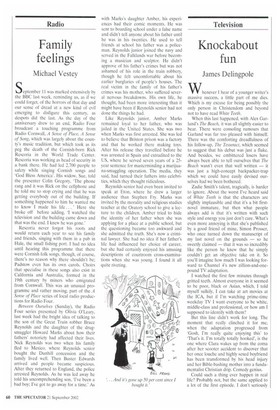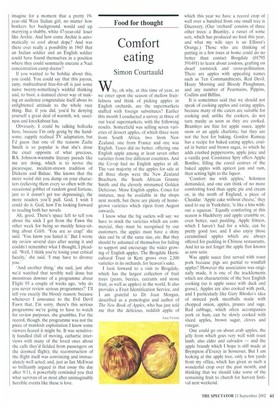Knockabout fun
James Delingpole
Whenever I hear of a younger writer's massive success, a little part of me dies. Which is my excuse for being possibly the only person in Christendom and beyond not to have read White Teeth.
When this last happened, with Alex Garland's The Beach, it was all slightly easier to bear. There were consoling rumours that Garland was far too pleased with himself. There was the comforting dreadfulness of his follow-up, The Tesseract, which seemed to suggest that his debut was just a fluke. And besides, we embittered losers have always been able to tell ourselves that The Beach wasn't even that well written — it was just a high-concept backpacker-trap which we could have easily devised ourselves had we been bothered.
Zadie Smith's talent, tragically, is harder to ignore. About the worst I've heard said of White Teeth is that the characters are slightly implausible and that it's a bit firstnovel immature, but then what people always add is that it's written with such style and energy you just don't care. What's even more annoying is that she's published by a good friend of mine, Simon Prosser, who once turned down the manuscript of my last novel on the grounds — so he sweetly claimed — that it was so incredibly like the person he knew that he simply couldn't get an objective take on it. So you'll imagine how much I was looking forward to Channel 4's new zillion-and-onepound TV adaptation.
I watched the first few minutes through gritted teeth. Almost everyone in it seemed to be poor, black or Asian, which, I told myself sulkily, I can take at art movies at the ICA, but if I'm watching prime-time weekday TV I want everyone to be white, middle-class and professional, or how am I supposed to identify with them?
But this line didn't work for long. The moment that really clinched it for me, when the adaptation progressed from 'Gosh, I'm really quite enjoying this' to 'That's it. I'm totally totally hooked', is the one where Clara wakes up from the coma after her scooter accident to discover that her once louche and highly sexed boyfriend has been transformed by his head injury and her Bible-bashing mother into a fundamentalist Christian drip. Comedy genius.
Could such a thing ever happen in real life? Probably not, but the same applied to a lot of the first episode. I don't seriously imagine for a moment that a pretty 19year-old West Indian girl, no matter how bonkers her background, would end up marrying a shabby, white 47-year-old loser like Archie. And how come Archie is automatically so cool about dope? And was there ever really a possibility in 1945 that an Indian soldier and an English soldier could have found themselves in a position where they could summarily execute a Nazi concentration camp doctor?
If you wanted to be bolshie about this, you could. You could say that this joyous, zany, multicultural free-for-all is just some naive twenty-something's wishful thinking and, to boot, a damned clever way of making an audience congratulate itself about its enlightened attitude to the whole race thing. But, if you did, you'd be denying yourself a great deal of warmth, wit, sauciness and knockabout fun.
Obviously, I could be talking bollocks here, because I'm only going by the handsome, zappily realised TV adaptation, but I'd guess that one of the reasons Zadie Smith is so popular is that she's done the exact opposite of what precious, B.S. Johnson-wannabe literary pseuds like me are doing, which is to revive the picaresque, incident-strewn tradition of Dickens and Balzac. She knows that the more weird shit you dump on your characters (relieving them every so often with the occasional gobbet of random good fortune, just so it doesn't get too depressing), the more readers you'll pull. God, I wish I could do it. God, how I'm looking forward to reading both her novels.
Ah, good. There's space left to tell you about the stick I got from the Fawn the other week for being so meekly fence-sitting about Celeb. 'You are so crap!' she said. 'You know you hated it.' But I wrote my review several days after seeing it and couldn't remember what I thought, I pleaded. 'Well, I think you're losing your critical faculty,' she said. 'I may have to divorce you,' 'And another thing,' she said, just after we'd watched that terribly well done but monstrous downer of a programme about Flight 93 a couple of weeks ago, 'why do you never review serious programmes?' I'll tell you exactly the bloody reason: because whenever I announce to the Evil Devil Fawn that. I'm sorry, there's this serious programme we're going to have to watch for review purposes, she grumbles. For the record, though, the programme was not the piece of mawkish exploitation I know some viewers feared it might be. It was sensitively handled (full of moving, cathartic interviews with many of the loved ones about the calls they'd fielded from passengers on the doomed flight); the reconstruction of the flight itself was convincing and immaculately well acted; and, just as Ian McEwan so brilliantly argued in that essay the day after 9/11, it powerfully reminded you that what survives of us most after unimaginably horrible events like these is love.











































































 Previous page
Previous page